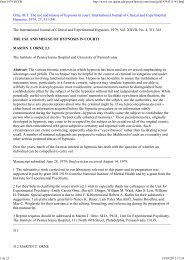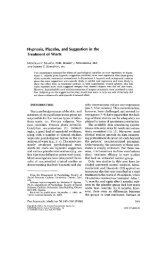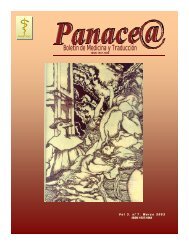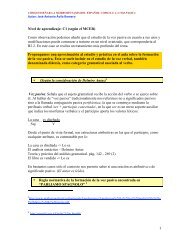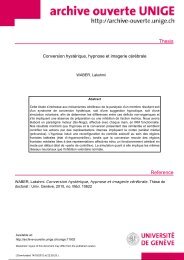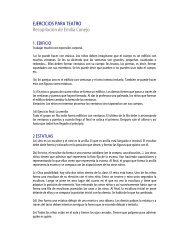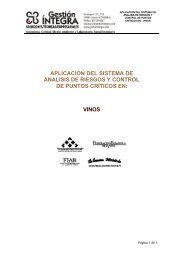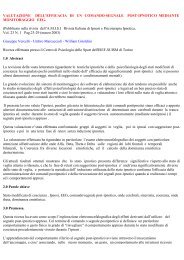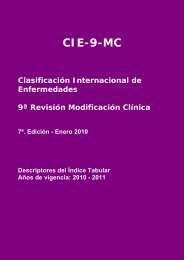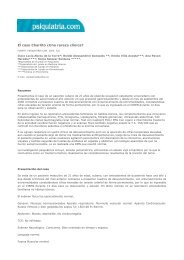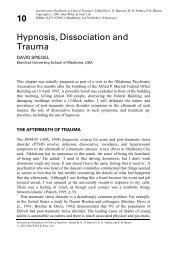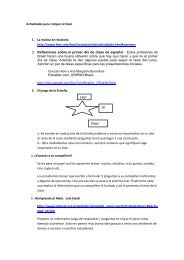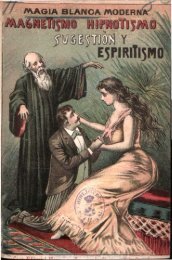Diccionario etimológico comparado de la lengua castellana
Diccionario etimológico comparado de la lengua castellana
Diccionario etimológico comparado de la lengua castellana
You also want an ePaper? Increase the reach of your titles
YUMPU automatically turns print PDFs into web optimized ePapers that Google loves.
F<strong>la</strong>gel-ante. ni.<br />
FLAGE PLAGI 2617<br />
Cfr. etim. f<strong>la</strong>gel-ar. Suf. -anle.<br />
SIGN.— !. Hereje <strong>de</strong> <strong>la</strong> secta que apareció en<br />
Italia en el siglo xni, y cuyo error consistía<br />
en preferir, como más eficaz para, el perdón<br />
<strong>de</strong> los pecados, <strong>la</strong> penitencia <strong>de</strong> los azotes a<br />
j <strong>la</strong> confesión sacramental.<br />
\<br />
2. Disciplinante, penitente que se azotaba<br />
públicamente en los días <strong>de</strong> semana santa.<br />
F<strong>la</strong>gel-ar. a.<br />
Cfr. etim. f<strong>la</strong>gelo. Suf. -ar.<br />
SIGN.—AZOTAR. Ü. i. c. r.<br />
F<strong>la</strong>g-elo. m.<br />
ETIM.—Del \ñL J<strong>la</strong>g-el-lu-m, -It, verdasca,<br />
vara <strong>de</strong>lgada, renuevo, tallo,<br />
azote, látigo, zurriago, disciplina, f<strong>la</strong>ge-<br />
lo ; <strong>de</strong>rivado <strong>de</strong>l prim. J<strong>la</strong>g-ru-m, azote,<br />
vara, verdasca, látigo; por medio <strong>de</strong>l<br />
suf. dimin. -ellu/n (cfr. elo). Sirve <strong>de</strong><br />
base á f<strong>la</strong>g-elluní^ y J<strong>la</strong>g-ru-m <strong>la</strong> raíz<br />
FLAG-, correspondiente á <strong>la</strong> indo-europea<br />
BHLAG-, golpear, sacudir, cuya aplicación<br />
cfr. en a-flig-ir. Derívase <strong>de</strong><br />
f<strong>la</strong>g-ru-m el ant. *J<strong>la</strong>g-ra-re, golpear, <strong>de</strong><br />
don<strong>de</strong> J<strong>la</strong>gr-iones, los siervos expuestos<br />
á ser azotados (Dicti servi quod J<strong>la</strong>g-<br />
7'is subiecli suntj; y <strong>de</strong> f<strong>la</strong>g-ellum <strong>de</strong>scien<strong>de</strong>n:<br />
J<strong>la</strong>g-e/i-are^ azotar; primit. <strong>de</strong><br />
f<strong>la</strong>ge<strong>la</strong>r y<br />
f<strong>la</strong>gell-atio, -íion-is, -íion-em^<br />
i prim. <strong>de</strong> f<strong>la</strong>ge<strong>la</strong>-ción. De f<strong>la</strong>gel-ar<br />
se <strong>de</strong>rivan f<strong>la</strong>ge<strong>la</strong>-dor y f<strong>la</strong>ge<strong>la</strong>nte.<br />
Le correspon<strong>de</strong>n: ital. ñagello ; cat.<br />
' f<strong>la</strong>gell; port. f<strong>la</strong>gello, etc. Cfr. aflic-<br />
ción, CONFLICTO, etc.<br />
SIGN.—Azote ó instrumento <strong>de</strong>stinado para<br />
azotar:<br />
Experimentarás tan <strong>de</strong> improviso mí f<strong>la</strong>gelo, que no<br />
lo puedas esquivar ni huir. Pell. Arg. par. 2, f. 42.<br />
F<strong>la</strong>g-i-cio. m.<br />
ETIM. — Del <strong>la</strong>t. f<strong>la</strong>g-i-tium, -íít\ pecado<br />
grave, maldad, torpeza, infamia,<br />
<strong>de</strong>shonor, vergüenza; <strong>de</strong>rivado <strong>de</strong> un<br />
l)rimit. <strong>la</strong>t. *f<strong>la</strong>g-are,<strong>de</strong> don<strong>de</strong> <strong>de</strong>scien<strong>de</strong><br />
el verbo frecuentativo ^^a^-Zí-ore, instar,<br />
importunar, pedir con instancia, coiiomper;<br />
por medio <strong>de</strong>l suf. -iiare (cfr. -itah);<br />
cuya raíz f<strong>la</strong>g-, <strong>de</strong> <strong>la</strong> primitiva bh<strong>la</strong>g<br />
=BHALG-, correspon<strong>de</strong> á <strong>la</strong> indo-europea<br />
BHARG-, alumbrar, lucir, resp<strong>la</strong>n<strong>de</strong>cer,<br />
bril<strong>la</strong>r; quemar, abrasar, incendiar;<br />
tostar, asai-, secar. Cfr. skt. ^nsT, bhrag\<br />
lucir, bril<strong>la</strong>r, resp<strong>la</strong>n<strong>de</strong>cer; grg. 'f/.c'v-w,<br />
inf<strong>la</strong>mar, alumbrai", quemar, hacer bril<strong>la</strong>r;<br />
prim. <strong>de</strong> -{¡d-^-ya^ -lAaT-o?, ardor, calor<br />
ardiente, l<strong>la</strong>ma, inf<strong>la</strong>mación, prim.<br />
<strong>de</strong> FLEGMA V flema; <strong>de</strong> don<strong>de</strong> fleg-<br />
M.4T-IC0 y FLE-MÁT-ICO; FLEG-MÓN y FLE-<br />
Mt»N; primitivos <strong>de</strong> flegmo-n-oso y fle-<br />
MON-oso. De 'fXe'Y-iAx <strong>de</strong>scien<strong>de</strong> ^X£Y-jAaa-ía,<br />
piim. <strong>de</strong> FLEG-MAS-ÍA y <strong>de</strong> <strong>la</strong> misma raíz<br />
•fXty-, cambiada en sXoy-, se <strong>de</strong>rivan: 'iX¿;,<br />
5X5Y-¿í, l<strong>la</strong>ma, fuego, ardor; <strong>de</strong> don<strong>de</strong><br />
ípAov-í;, -íBo;, trozo <strong>de</strong>caiue asada; íaoy-uu),<br />
inf<strong>la</strong>mar; primit. <strong>de</strong> vXoy-it-tó?, -t/$. -t¿v<br />
inf<strong>la</strong>mado, consumido por <strong>la</strong>s l<strong>la</strong>mas;<br />
<strong>de</strong> don<strong>de</strong> floglsto (cfr.), primitivo <strong>de</strong><br />
FLOGíSTico; 5A0Y-¿w, inf<strong>la</strong>mar; prim. <strong>de</strong><br />
®X!$Y-wj'.;, inf<strong>la</strong>mación, <strong>de</strong> don<strong>de</strong> <strong>de</strong>scien<strong>de</strong><br />
FLOGOSIS. Cfr. <strong>la</strong>t. fraxi-nus^ -ni\<br />
prim. <strong>de</strong> fresno, <strong>de</strong> don<strong>de</strong> el adj. //'axin-eus^<br />
-ea, -eum y /raxin-us, -a, -um,<br />
<strong>de</strong> ma<strong>de</strong>ra <strong>de</strong> fresno (cfr. en-frasc-arse);<br />
fr ig-ere, freir, asar, tostar; |)rimil.<br />
<strong>de</strong> freír {=*/reg-ir=freü\ por síncopa<br />
<strong>de</strong> <strong>la</strong> g- y cambio <strong>de</strong> vocales y <strong>de</strong> conjugación);<br />
fric-tu-s^ -ta, -tum, (part. pas.),<br />
prim. <strong>de</strong> frito, <strong>de</strong> don<strong>de</strong> frit-ura,<br />
FRIT-ADA y FRiT-iLLAs; //rtm-ma [ = f<strong>la</strong>gma,<br />
por asimi<strong>la</strong>ción, grg. fAÍ;), prim.<br />
<strong>de</strong> FLAMA y éste <strong>de</strong> l<strong>la</strong>ma, <strong>de</strong> don<strong>de</strong><br />
FLAM-EAR y LLAM-EAR (fl=/l-), que etimológ.<br />
significa c/ue luce, que bril<strong>la</strong>;<br />
<strong>de</strong> don<strong>de</strong> f<strong>la</strong>m-m-are, encen<strong>de</strong>r, inf<strong>la</strong>mar,<br />
incitar, instigar; prim. <strong>de</strong> f<strong>la</strong>mm-ans,<br />
-antis, -antem, <strong>de</strong> don<strong>de</strong> se <strong>de</strong>rivo<br />
f<strong>la</strong>m-ante (=(|ue bril<strong>la</strong>, que luce);<br />
f<strong>la</strong>men, -min-is, prim. <strong>de</strong> f<strong>la</strong>men (cfr.),<br />
sacerdote romano antiguo; que etimológicamente<br />
significa el que quema <strong>la</strong>s<br />
victimas; <strong>de</strong> don<strong>de</strong> f<strong>la</strong>m-in-ius, saceidotal;<br />
7?am-m-/a. casa <strong>de</strong>l ^^acerdote (fué<br />
usado luego como nombre |)ropio. Fiaminio);<br />
f<strong>la</strong>g-ra-re, ar<strong>de</strong>r, estar hecho<br />
fuego; prim. <strong>de</strong> f<strong>la</strong>g-rar, <strong>de</strong> don<strong>de</strong><br />
f<strong>la</strong>g-ra-ns,-ant-is,-ant-em, prim <strong>de</strong> f<strong>la</strong>-<br />
GR-ANTE ( = resp<strong>la</strong>n<strong>de</strong>ciente, que está<br />
bril<strong>la</strong>ndo, luciendo, que está á <strong>la</strong> vista);<br />
f<strong>la</strong>m-m-eum prim. <strong>de</strong> f<strong>la</strong>meo, velo <strong>de</strong><br />
color <strong>de</strong> fuego, <strong>de</strong> que usaban los es-<br />
|)0sas; f<strong>la</strong>m-mi-ger, -ger-a, -ger-um {=e\<br />
que arroja l<strong>la</strong>mas), prim. <strong>de</strong> f<strong>la</strong>m-í-<br />
GERO, (cfi-. etim. <strong>de</strong> -ger, en ger-ente);<br />
f<strong>la</strong>m-m-u<strong>la</strong> (cfr. suf. -u<strong>la</strong> en -ulo); <strong>de</strong><br />
don<strong>de</strong> flámu<strong>la</strong> = ( ban<strong>de</strong>ra pequeña);<br />
fulg-ere, bril<strong>la</strong>r, resp<strong>la</strong>n<strong>de</strong>cer, fulgurar;<br />
<strong>de</strong> don<strong>de</strong> fulg-ens, -ent-is, (part. i»res ),<br />
que resp<strong>la</strong>n<strong>de</strong>ce; prim. <strong>de</strong> fulgente; y<br />
fulg-i-dus, -da, -dum, prim. <strong>de</strong> fúlg-ido;<br />
fulg-or, -oris, bril<strong>la</strong>ntez, resp<strong>la</strong>ndor; <strong>de</strong><br />
don<strong>de</strong> fulgor; fulg-ur, -ur-is, relámpago,<br />
rayo, resp<strong>la</strong>ndor; prim. <strong>de</strong> fulgurare,<br />
re<strong>la</strong>mpaguear; <strong>de</strong> don<strong>de</strong> fulgur-ans^<br />
M. Ca<strong>la</strong>ndrelli. 262.



